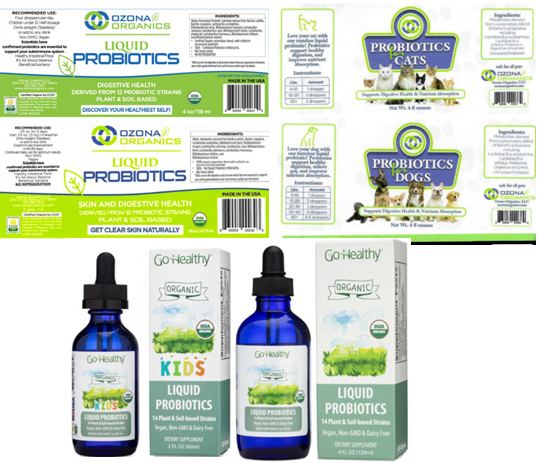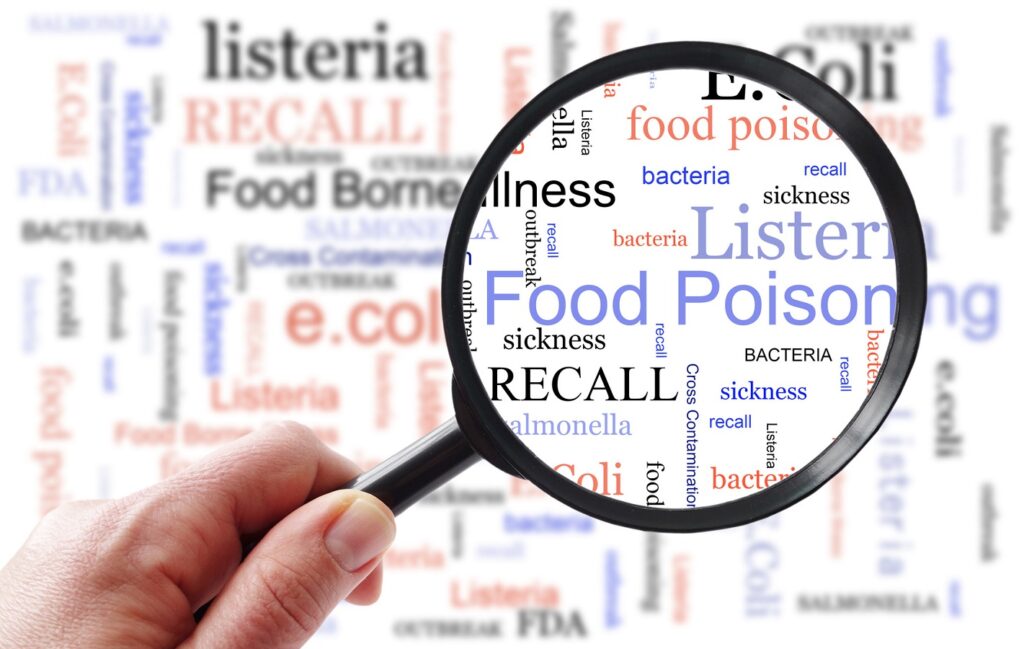The FDA reported that Ozona Organics, LLC of Ozona, Texas, recalled its 4-ounce and 16-ounce bottles of Ozona Probiotics for Digestive Health (intended for human use), also labeled as GoHealthy Probiotics for Infants, Toddlers, and Kids in 2-ounce bottles and GoHealthy Probiotics for Infants, Kids, Men and Women in 4-ounce bottles because they have the potential to become contaminated with microbial growth. The recall is due to high Aw in the formula that provides a potential for microbial growth. The Ozona Probiotics for Digestive Health lots were distributed through the company’s website. Lots of GoHealthy Probiotics were distributed through the company’s website and Walmart stores. The Ozona Probiotics for Digestive Health products come in 4-ounce, blue glass bottles and 16-ounce, blue plastic bottles. The GoHealthy Probiotics for Infants, Toddlers, and Kids come in 2-ounce, blue glass bottles. The GoHealthy Probiotics for Infants, Kids, Men, and Women come in 4-ounce, blue glass bottles. Ozona Organics Dog, Cat, Equine, and Swine Probiotics (intended for animal use) are being recalled in their entirety. The distribution dates for affected products are from August 2021 through July 2023. The recalled lots were distributed through the company’s website. Ozona Organics Probiotics for Dogs and Probiotics for Cats come in 4-ounce, blue glass bottles with droppers. Ozona Organics Probiotics for Equine and Probiotics for Swine comes in 1-gallon white plastic bottles with handles. @ https://www.fda.gov/safety/recalls-market-withdrawals-safety-alerts/ozona-organics-issues-voluntary-recall-select-liquid-probiotic-products-due-possible-health-risk?utm_medium=email&utm_source=govdelivery
Ozona Organics, LLC of Ozona, Texas, is recalling its 4-ounce and 16-ounce bottles of Ozona Probiotics for Digestive Health (intended for human use), also labeled as GoHealthy Probiotics for Infants, Toddlers and Kids in 2-ounce bottles and GoHealthy Probiotics for Infants, Kids, Men and Women in 4-
ruth
CORE update as of August 02, 2023, the CORE list of outbreaks and adverse events includes seven active cases. No new outbreaks were added to the table this week. In the outbreak of Cyclospora cayetanensis (ref #1171), the case count has increased from 39 to 47 cases. For the outbreak of Cyclospora cayetanensis (ref #1163), the case count has increased from 121 to 140 cases. For the outbreak of Salmonella Paratyphi B var. L(+) tartrate+ (ref #1157), the case count has increased from 35 to 36 cases. For the outbreak of Cyclospora cayetanensis (ref #1159), the case count has increased from 68 to 69 cases. @ https://www.fda.gov/food/outbreaks-foodborne-illness/investigations-foodborne-illness-outbreaks?utm_medium=email&utm_source=govdelivery
The following is a list of outbreak and adverse event investigations primarily being managed by FDA’s CORE Response Teams.
ruth
The Journal of Food Protection (Volume 86, issue 7, July 2023) published an article by researchers from the FDA and CDC (Pereira et al. entitled “Multinational Outbreak of Listeria monocytogenes Infections Linked to Enoki Mushrooms Imported from the Republic of Korea 2016–2020”). The publication describes an outbreak of Listeria monocytogenes infections linked to imported enoki mushrooms required a multinational collaborative investigation among the United States, Canada, Australia, and France. The outbreak included 48 ill people, 36 in the United States and 12 in Canada, and was linked to enoki mushrooms from one manufacturer in Korea. The outbreak resulted in an extensive recall in the US and Canada. The study findings suggest that uncooked enoki mushrooms should be considered as a potential vehicle that may lead to listeriosis. The research concludes that using WGS, combined with judicious international data sharing, is essential for identifying and stopping future outbreaks of infectious diseases. @ https://www.sciencedirect.com/science/article/pii/S0362028X2306773X
ruth
Drug resistant fungi are a growing problem worldwide. Cell Chemical Biology published (Iyer, K. R., et al. (2023) Identification of triazenyl indoles as inhibitors of fungal fatty acid biosynthesis with broad-spectrum activity. Cell Chemical Biology) a study by RIKEN Center for Sustainable Research Science (CSRS) and the University of Toronto have discovered a new way to attack fungal infections. The key is to block fungi from being able to make fatty acids, the major component of fats. Currently, there are only three major classes of antifungal medications, and all of them work by destroying the barrier that surrounds fungal cells. A compound named NPD6433 was the least toxic to human cells and reduced the growth of Aspergillus fumigates. The researchers looked at how much NPD6433 suppressed growth in yeast when the yeast was missing one copy of the gene. They found that reduction in only one gene, fatty acid synthase, made yeast more susceptible to NPD6433. This result meant that NPD6433 likely works by inhibiting fatty acid synthase and thus prevents fatty acids from being made inside fungal cells. Further experiments showed that NPD6433 and cerulenin, another fatty acid synthase inhibitor, were able to kill numerous yeast species in culture. Tests showed that treating infected worms with NPD6433 reduced fatalities by about 50%. Importantly, this was true in worms infected with yeast resistant to standard antifungal medication. @ https://www.news-medical.net/news/20230731/New-way-to-attack-fungal-infections-discovered.aspx
Researchers at the RIKEN Center for Sustainable Research Science (CSRS) and the University of Toronto have discovered a new way to attack fungal infections.




